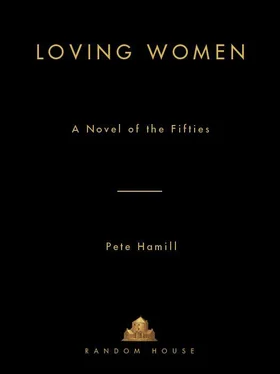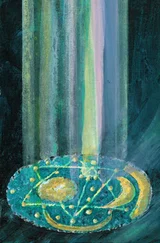At the bottom of the sea bag were three books, and I took them out, too. One was The Bluejackets’ Manual , navy blue and compact; it was a kind of catechism for sailors, full of rules and regulations. The second was a book my Aunt Margaret had given me for Christmas. She was my mother’s sister and was married to an undertaker and lived in Manhattan. She was always giving me books. This one was called A Treasury of Art Masterpieces . It had been put together by someone named Thomas Craven. On the cover, there was a beautiful yellow-haired woman rising naked from the sea, one hand covering a breast, the other holding the long hair over her crotch. The third was The Blue Notebook. I slipped it inside the art book and put the books deep into the back of the locker.
Waleski came back with a blanket, a pillow and a mattress cover. “They say every man in this man’s Navy is guaranteed three squares a day and a dry fartsack,” he said. “Here’s the fartsack.”
As he turned to leave, I asked him who the horn player was. Waleski cocked his head, listening. “You mean Bobby Bolden? He’s a bad ass, a war hero, a prick, and a whoremaster. But he sure can play the saxophone, can’t he?”
“Sure can.”
“Want some advice? Stay away from him.”
I remember shaving for the first time in the deserted head with its shallow sinks and small mirrors, urinals and doorless toilet stalls. In a corner there was a metal trashcan fitted with a large white laundry sack. A hand-lettered sign said: LUCKY BAG. In the Navy, that was where you threw stray or worn-out clothing, and you were free to take anything that you might use. I glanced at it and thought: She smoked Luckies . She was out there somewhere. Probably with a man. A man who knew what he was doing. Who didn’t have a kid’s smooth face or have to submit to the discipline of the Navy. She was out there. In Palatka. A breeze lifted the palm fronds outside the screened window, rattling them against one another. And I thought: Until this day I’ve never seen palm trees. Except in movies and comics and National Geographic. And here I am, shaving at a sink, and they’re right outside the window. I can hear them rattle. I can hear them sigh. I could walk outside and touch them. In Florida . Pen-sa-co-la. I’m here. I’ve come a long way from Brooklyn to this special place. I’ve done it. She smoked Luckies with her left hand .
In the shower, I turned the hot-water knob as high as I could, hoping the hurting water would wash away the long trip, the three different buses and drivers, perhaps even the fragile memory of the woman with the curly hair. I didn’t want to leave the scalding luxury of the shower. Until I went into the Navy, I’d never showered alone. To stand under a shower alone, your hair squeaking and your skin pink and red: paradise. I felt that then; I believe it now, and to hell with the Freudian interpretations. I remember confessing this once to a guy in boot camp. Told him I’d never taken a shower alone. And he didn’t believe me. He had grown up in a house, not a railroad flat in Brooklyn. I couldn’t explain about our flat, with its L-shaped bathroom — the tub crammed into one arm of the L, the toilet in the other, with a sink in between. In the years since, I’ve tried to explain it to women who wanted to know why I spent so long in the shower, telling them how there was barely room to turn around and the water pipes were scalding hot in all seasons so you could never relax and lean against them, and the roaches fattened in the dampness and the single window was sealed by generations of paint. Women didn’t get it. Nobody gets it. And on that first day in Ellyson Field, even I was sick of the images of my old life. Hey, man (I said to my young self): Stop this! You’re here. You made it. You’re in Florida, and it’s snowing in New York .
I was drying myself with a towel when I heard Bobby Bolden playing again. A quick jump tune. The words moved through my head: Jumpin with my boy Sid in the city. He’s the pres-i-dent of the deejay committee … Lester Young wrote it and King Pleasure sang it. For Symphony Sid’s radio show on WEVD, the ethnic radio station. I used to listen at night, fall asleep, and wake up to a lot of singing Hungarians. The weirdest station in New York. They had a Hungarian hour and a Russian hour and an Irish hour and a Lithuanian hour. And every night at midnight, Sid showed up to play jazz. I was then so young that I actually cared about being hip or square, and I knew that Sid was hip. I was also sure that Bobby Bolden was hip, even though I’d never met him. And I thought: I gotta meet this guy . I finished drying myself, wrapped a towel around my waist and wriggled into the shower shoes. I picked up the ditty bag and soiled skivvies and flip-flopped back to the bunk
I paused in the archway. An older sailor was standing at my bunk, a billy club attached to his wrist with a leather thong. He was tapping it gently on his thigh. A first-class gunner’s mate. In dress whites. He was shorter than I was, but his back was very straight and muscles rippled under his tight jumper. There were three hash marks on his sleeve, each standing for a four-year hitch. He looked like a battering ram. And I felt suddenly afraid. Not of the hard body. Or the billy club. It was his face. Pale red sideburns. The white hat precisely two fingers above where his brows should have been. Except that he had no eyebrows. And no eyelashes. His eyes were a slushy pale blue and he didn’t blink. His mouth was a slice. Lipless. Without color. Bracketed by two lines that seemed etched into his cheeks. The skin on his face was shiny. Like plastic. This was my first sight of Red Cannon.
He moved a few feet to his left and stood beside the locker I’d chosen. His eyes never left me. He didn’t speak a word. For a moment, I felt as if I were looking down from the ceiling at the two of us. I saw the empty barracks, the palm trees outside, and felt the breeze coming through the windows. And the young man facing the Old Salt. We locked eyes for a long time. Two seconds or an hour. Even now I can remember the feeling, the knowledge that if I broke the stare I was doomed. Fear entered my belly like a piece of ice.
Finally, without taking my eyes off him, I said: “Excuse me.” I reached for the locker but the gunner’s mate didn’t move. I would have to go though him to get to the locker.
“That’s my locker,” I said.
Something like a smile showed on his face. But he didn’t move. For a moment his eyes clouded, as if a drop of milk had been added to the slushy blue. And then they were diving deep into me, probing for weakness or softness like a knife. And I broke it off. I turned to the side and fiddled with my towel and groped in the ditty bag for something I didn’t want. I felt humiliated. The gunner’s mate had faced me down. And I’d quit to him like a dog. In this strange and alien place. On New Year’s Day. A long way from home.
“What’s your name, boy?” the man whispered.
“Michael Devlin.”
“Your Navy name, boy.”
“464 0267.”
“464 0267, what ?”
“464 0267, sir.”
There was a long, silent moment. He stared at me, and I tried to smile in a casual way to cover up my fear.
“Open it,” he said, stepping aside from the locker. His short arms were hanging at his sides. “Let’s see what y’ got heah, boy.”
I turned the combination lock. Six, for the month I was born.
Twenty-four, for the day. Thirty-five, for the year. I unhooked the lock and lifted the latch and opened the locker door. The gunner’s mate stared into it. Then, with his free hand, he grabbed the edge of the door and slammed it hard. The sound was explosive. He did it again. And again, the metallic sound caroming through the barracks. And then he did it once more.
Читать дальше












